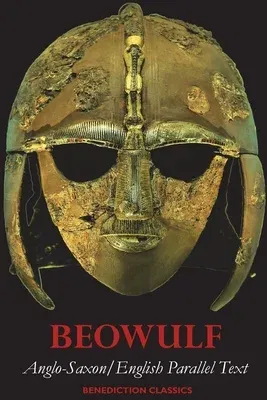A unique parallel edition of Beowulf with the original Anglo-Saxon
and Gummere's celebrated poetic translation on facing pages.
"The whole thing is sombre, tragic, sinister, curiously real. ... . It
is laden with history, leading back into the dark heathen ages beyond
the memory of song, but not beyond the reach of imagination" - J. R.
R. Tolkien.
The epic Anglo-Saxon poem Beowulf had "a deep and detailed impact on
what Tolkien wrote - from his earliest poem of Middle-earth (1914),
right through The Hobbit ... and The Lord of the Rings." - John
Garth author of Tolkien and the Great War.
"The story of Beowulf, Grendel, Grendel's mother and the Dragon [is]
surely the basic story of all literature ... It is an epic that summons
up a world whose trappings have long since disappeared, the trappings of
the warrior ethos, and morality of almost prehistoric Germanic times;
but the essential 'message' has not changed. It is about courage and
resolve, about duty and responsibility, about honour and achievement;
but it is also about the transitoriness of things, and the inevitability
of death, however glorious the life. It is both a celebration of
humanity and an elegy. The poem Beowulf is one of the glories of
European literature." - Magnus Magnusson.
Beowulf*,* the greatest work of Anglo-Saxon literature, and "one
of the glories of European literature," is set in the mists of
Scandinavia, interweaving history and myth. It has been translated into
English over seventy times, has been widely studied, and has influenced
the popular imagination through Tolkien's Hobbit and Lord of the
Rings.
The young hero, Beowulf, receiving reports that a monster has been
terrorising the neighbouring Danes nightly in their sumptuous mead hall
Heorot, sails to their aid with a small band of warriors. The Danish
King Hrothgar, amazed at his courage, honours him with a celebratory
feast, after the shadowy monster Grendel strikes. Beowulf, a man of
suprahuman strength, though unarmed, fatally wounds Grendel, and later
defeats his terrifying mother.
Beowulf returns to Geatland, becomes King, and ruling with wisdom
equalling his courage and strength, establishes peace for fifty years.
However, an enterprising slave steals a jewelled cup from a sleeping
dragon's hoard, whereupon the enraged dragon emerges spewing flames,
killing villagers, and destroying homes. Beowulf, defender of his
people, seeks the dragon in its lair; however, once the fire-breathing
dragon emerges, he is abandoned by all but the young Wiglaf. The two
ultimately slay the dragon, but only at the cost of a mortal injury to
Beowulf. Beowulf, who has triumphed gloriously in life and died
tragically, is given a funeral equal to any of the heroes of The Iliad
or The Aeneid.
This dual-language edition will be enjoyable for general readers, and
invaluable for students who would like to read Beowulf in either
Anglo-Saxon or modern English, while dipping into the other language to
deepen pleasure or comprehension. It provides an enjoyable experience of
the epic poem Beowulf.


